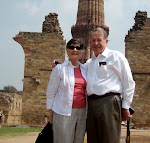

It's true--we have actually started digging. What an exciting day for all of us. We have in place the temporary housing for the workers, the land has been cleared, and the puja (religious ritual) was performed. The marking of the building was done and indicated with posts and strings. The contractor has rented a home in a nearby village and yesterday we were invited to the blessing on his home. We had to be present at all these occasions--in fact this morning we found them waiting for us before they took the first ground up.
The first shovelful was dug at exactly 9:30 a.m. A big digger can move quite a bit of dirt and as the day progressed there were large holes the whole length of the school for the foundations. It was fun to see how many bosses there were standing around watching the progress. Everyone likes to be the boss--and with that job you stand around a lot.
We have begun on the school first since we ran into some numbers on the bid, which substantially raised the cost of the volunteer hostel. We think with a bit a redesign and taking off some frills, we are back in line with our original estimates. At this point we are a little gun-shy to say the least. Many things that would be included in a bid price at home are not included here. Some are very important, like sewer, water, electrical, etc. We have seen the surprises that can occur with foreigners who think the system works like their own.
Ron and Joyce are leaving tomorrow for Bhutan to spend a week exploring with their friends from home, Bob and Jelean Montgomery. We will send pictures and tell you a bit about it when we return.










